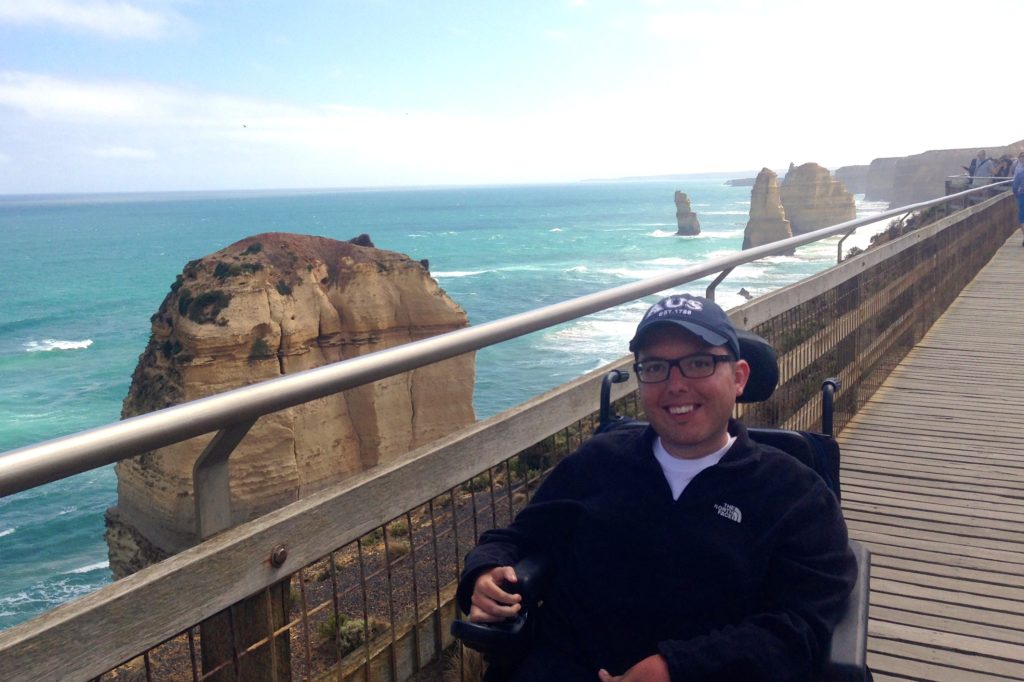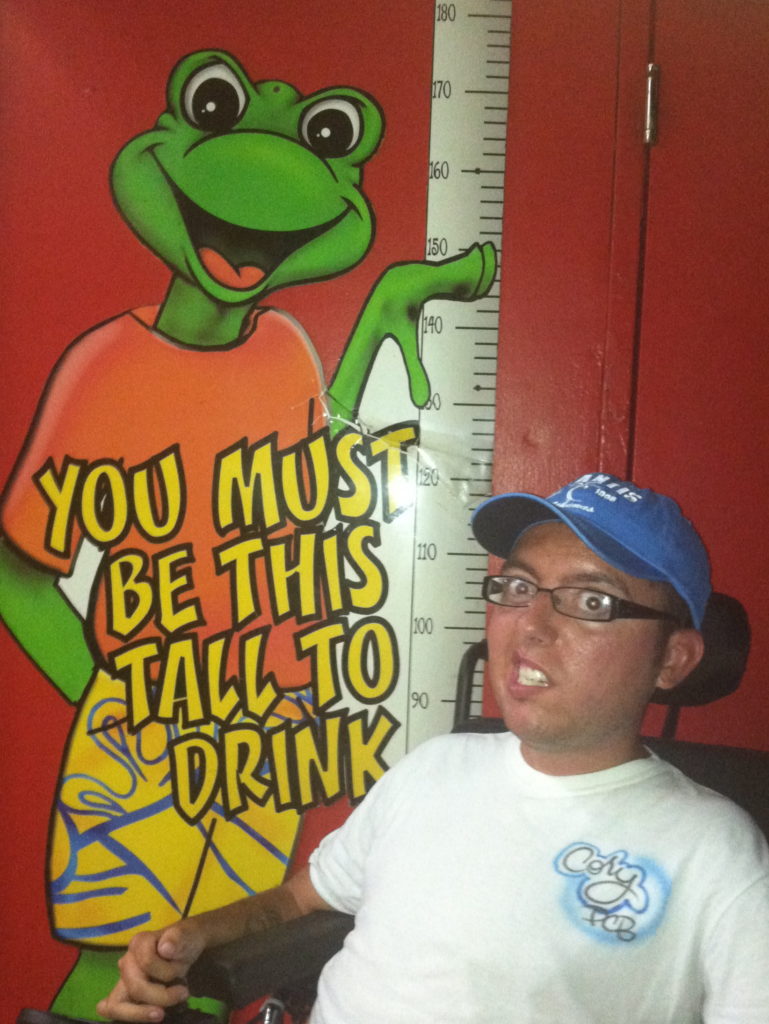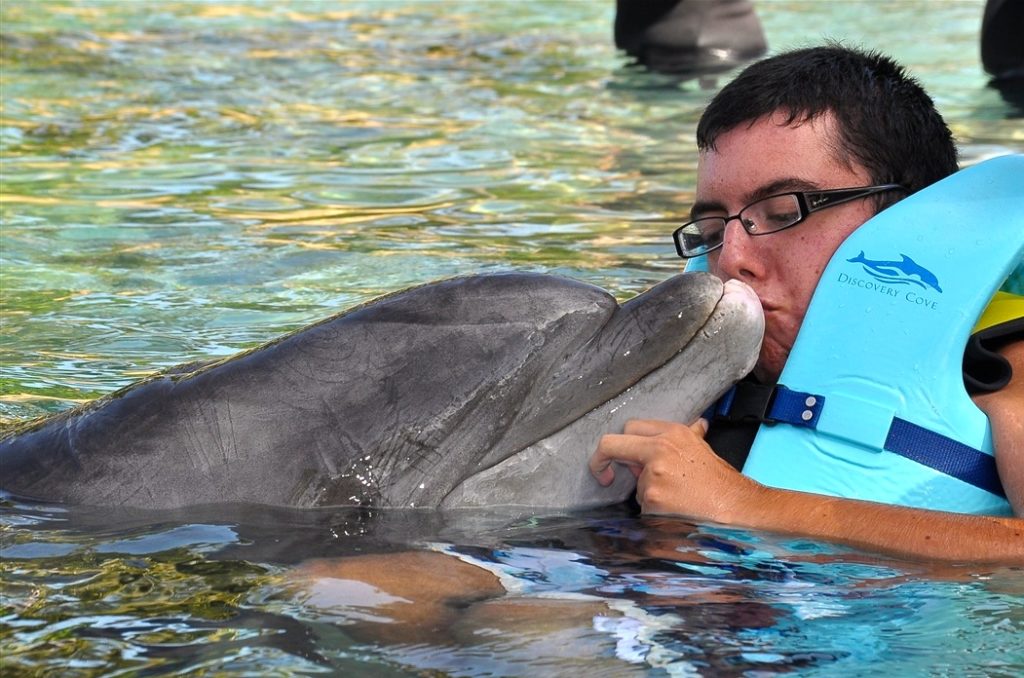How to Explore the World With a Physical Disability With Cory Lee
This is part of my unconventional interview series, designed to demonstrate the wildly varied ways we can live, work, and chase our dreams. Please keep in mind that, since these are interviews, the opinions, methods, and websites contained within do not necessarily reflect my own views or experiences. (Which is, in my opinion, part of what makes them wonderful.)
First, tell us about you.
Hey! I’m Cory Lee and I live in Georgia, USA. I’m 25 years old and I run a travel blog that focuses on wheelchair accessible travel at curbfreewithcorylee.com. At the age of two, I was diagnosed with Spinal Muscular Atrophy. It’s a form of Muscular Dystrophy and basically just means that my muscles are much weaker than the average person’s, making me unable to walk. I’ve never really known anything different, so I don’t let it hold me back in any way. I’m determined to explore as much of this world as possible. In my free time, aside from traveling and working on my site, I love going to concerts, watching movies, and trying new foods.
When did you first start traveling and what made you fall in love with it?
My mom worked at an elementary school while I was growing up, so she was off every summer for a few months. We took this time to explore locally and domestically with road trips to places like Florida and Washington, DC. We’ve been to Disney World pretty much every year of my life and even though we mostly just traveled along the US east coast when I was younger, this showed me that there was so much more out there in the world. We traveled internationally for the first time when I was 15 and took a trip to the Bahamas. This showed me a different culture for the first time and I fell head over heels in love with traveling.

What are some of the biggest challenges of traveling with a physical disability?
There are lots of challenges, but I always try to remain positive about anything. Flying is a huge obstacle and many people with disabilities don’t travel because they’re scared to fly. The airlines aren’t the most considerate when it comes to handling a 300 pound powered wheelchair, but there are ways to lessen the likelihood of the chair being damaged.
I always take my joystick in my carry-on bag and sometimes I’ll take my wheelchair’s footrests and armrests. These are the parts that can most easily be broken so taking them in your carry-on can reduce the risk. Luckily, I’ve never had any major damages to my wheelchair and hopefully I can keep this up.
Another challenge is keeping my wheelchair charged up in foreign countries. On my first night in Germany, we plugged my wheelchair battery charger into the wall with an adapter and converter and it blew up. Sparks were flying and the power in the entire hotel even managed to go out. It was madness for about 15 minutes, but luckily the hotel management never found out that it was us who caused the outage. (Whew.) The next day I hunted down a wheelchair repair shop in Munich and bought a new 240 volt charger. It set me back about $250, but I have used that 240 volt charger in many foreign countries since buying it, so it was a good investment.
What have been some of the greatest joys of travel for you?
The greatest joy that I get from traveling is being able to see new cultures and broaden my horizons. The world is so big and I would hate to know that I didn’t try to see as much of it as possible while I’m here. It’s also awesome to think about how much I’ve learned traveling. I feel like I have learned more from traveling throughout my life than I did from college. Reading about something is one thing, but actually seeing it gives you a whole new appreciation.

What advice would you give to others who want to travel with a disability?
I would tell them to just go for it. Easier said than done, I know…but for every problem there is a solution. Things could go wrong in the comforts of your own home, so don’t be scared to get out there and explore just because you are in a wheelchair. Just plan as much as possible before going so that you’ll kind of know what to expect once you get there. I always say that I’d rather go and possibly wish I hadn’t than stay home and wonder if I could/should have gone.
For those traveling with a disability, what destinations would you recommend (and what places would you advise people to stay away from)?
There are so many awesome destinations so it’s hard for me to narrow it down. But the two destinations that immediately come to mind when I think of accessibility are Sydney and London. All of London’s famous black cabs have a foldout ramp so that a wheelchair can get inside. This was so convenient and surprising since it’s an older city. European destinations are always very hit-or-miss when it comes to accessibility. For example, Germany had pretty good access, but Paris was one of the least accessible cities I’ve ever been to. The metro wasn’t accessible and there was only one accessible taxi in the whole city that I could find. To rent it for just one day, it cost me a whopping 650 €! It was crazy expensive, but I had to do it in order to see anything. I’m really hoping that Paris will become more wheelchair friendly one day because I’d love to be able to go back and fully enjoy it.
What have been some of your favorite places so far?
My all-time favorite place is definitely Australia. I went last year for the first time and loved everything about it. The weather was amazing, there was TONS to do, and the wheelchair accessibility was magnificent. There were plenty of accessible taxis and all of the ferries within Sydney were accessible, so getting around was a breeze. Also, all of the attractions, restaurants, and shops were accessible, which was very nice. In many ways, I think that Australia (Sydney especially) is more accessible than the US.

Do you research accessibility before you go? Any resources you’d recommend for planning a trip?
When I’m planning a trip, I usually start researching about six months beforehand. Traveling with a wheelchair means that I need to start researching as early as possible. I have to see if there is accessible transportation in my chosen destination first and foremost. Without it, I would just be stuck at the airport upon arrival. Google is fantastic for researching accessibility. There is a ton of information out there on the internet, but finding it isn’t always easy. Sometimes I’ll spend hours or even days searching for answers, but hopefully my blog will make that process a little easier for others. Lonely Planet also has the Travel for All community on Google+. It’s a great place to ask any questions and learn more about which destinations are accessible.
Any tips for researching, booking, or planning transportation?
Before you try to find out about accessible taxis, research the accessibility of public transportation. Taking the metro or buses instead of a taxi will be much cheaper, meaning that you’ll have more money for souvenirs. In modern cities, public transportation is usually accessible to some degree. If you can’t find the information online about accessibility, reach out to the local tourism board. They will be able to direct you to the right people who have the answers. When I visited Asheville, North Carolina, last year, I asked the tourism board about wheelchair accessibility for attractions and they gave me the email address of a guy who wrote an entire book called Access North Carolina. This book was full of useful information and was a huge help in planning my trip. So it’s definitely worth asking the tourism boards.
Do you travel alone? If not, who do you travel with?
I don’t travel alone because I do need assistance transferring into the plane seat, into the shower, bed, etc. It would be pretty impossible for me to travel solo, but I really enjoy traveling with others. As they say, “The more, the merrier!” My mom loves traveling almost as much as I do, so she does go with me a lot, but I’ve also traveled with friends and other family members as well.
What’s next for you? Any big adventures in the works?
I will be attending the No Barriers Summit in Park City, Utah, this July. It will be my first time in Utah and my first time trying out rock climbing, scuba diving, kayaking, canoeing, and more. Every activity at the summit is adaptive, so people with any disability can be adventurous for a few days. After that, I’ll be heading to Iceland this September. It’s been a huge dream destination of mine forever and I’m immensely excited to finally be going! It isn’t somewhere that most people think of as being accessible, but I’m hoping to show that it is a wheelchair friendly destination.
Big thanks to Cory Lee for sharing his experiences. And now onto you guys: any questions for Cory Lee? Any comments on your own experiences?
Comments
-
Jessica
“Things could go wrong in the comforts of your own home”. That is a great metaphor for life, really, disability or no.
I have a chronic illness that has only recently gone into remission. It was always scary traveling somewhere (being sick and not near my own bed), but my husband and I have always tried our best to not let it stop us from fully living within the parameters that I have.
Thank you for sharing your story!
-
Tamara Comerford
I’m so excited to hear about your trip to Iceland, Cory! I hope you have fun exploring like Pippa did on her big wish trip! Say hello to Snorri (Kvosin Downtown Hotel) and Jon Gunnar (Access Unlimited) for us! 🙂
-
Wooden Ramps
I am very proud of you. For not letting your condition stop you from living life to the fullest. Very inspirational. Thank you for being an inspiration. Good article.
-
Morgan
This is an incredibly insightful post! Cory’s perspective is so positive and inspiring. Traveling is an experience that everyone should have access to, regardless of any physical condition. Great interview! Thanks so much for sharing!
-
larissa
I’m so glad that people in wheelchairs or with other disabilities have been able to gain more access to more places! Some builders might view wheelchair accessibility as a hassle, but things like ramps and curb cuts benefit more than just the wheelchair bound. Thanks for sharing. It is definitely impressive to learn of all of the research that goes behind traveling with disabilities but you show so much dedication to your love of travel!
-
Ryan
Wow what an inspiring story! It really helps put my life into a new perspective, thanks for sharing this!

David Wieselmann
You are such an inspiration! I have been in a wheelchair for 5 years and can identify with most of what you wrote. I try to go out and travel as much as I can. Great to hear about your experiences#